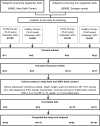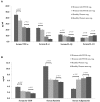Comparative Evaluation of Biomarkers of Inflammation Among Indian Women With Polycystic Ovary Syndrome (PCOS) Consuming Vegetarian vs. Non-vegetarian Diet
- PMID: 31781027
- PMCID: PMC6857098
- DOI: 10.3389/fendo.2019.00699
Comparative Evaluation of Biomarkers of Inflammation Among Indian Women With Polycystic Ovary Syndrome (PCOS) Consuming Vegetarian vs. Non-vegetarian Diet
Abstract
Background: Sub-inflammation and insulin resistance characterize women with PCOS. Data on dietary modulation of inflammation among PCOS women is scant, particularly from Indian subcontinent. The present study aimed to assess the effect of plant based vs. animal origin diets on serum markers of inflammation (primary outcome measure). Methods: This observational case-control study compared age and BMI matched PCOS and apparently healthy women from two populations following different dietary practices. The vegetarian women from New-Delhi (n = 82 PCOS and n = 179 healthy) and non-vegetarian women from Srinagar (n = 62 PCOS and n = 141 healthy) formed the groups. Using a uniform methodology, detailed clinical, biochemical, hormonal, and inflammatory marker assessment was undertaken. Results: The mean age of the overall cohort was 26.23 ± 4.59 years with a mean BMI of 24.39 ± 3.72 kg/m2. Overall pro-inflammatory markers (TNF-α, IL-6, IL-1β, hs-CRP and serum resistin) were significantly higher (p ≤ 0.05) and anti-inflammatory markers (IL-10 and adiponectin) were lower among women with PCOS than healthy subjects. On comparing vegetarian women with non-vegetarians, higher daily calorie intake (1895.46 ± 258.19 vs. 1860.13 ± 323.96 Kcal) with a higher protein and fat and lower carbohydrate intake was recorded in the latter, although the percent energy derived from carbohydrates was higher among vegetarians. Clinical and biochemical parameters were comparable among the groups except mFG score, total serum testosterone and serum lipid levels which were higher among non-vegetarian women as compared to their vegetarian counterparts from both categories (PCOS and healthy). Interestingly, vegetarian women with PCOS and healthy women had higher serum pro-inflammatory and lower anti-inflammatory markers compared to their non-vegetarian counterparts. Conclusion: Women with PCOS consuming Indian vegetarian diet have higher pro-inflammatory and lower anti-inflammatory marker levels than their age and BMI matched healthy non-vegetarian counterparts. This interesting observation can be attributed to the dietary composition, among other factors and needs confirmation from well-designed randomized studies on a larger cohort. Clinical Trial Registration: The study was registered with CTRI database under registration number CTRI/2013/09/003996.
Keywords: PCOS; adiponectin; hs-CRP; inflammation; insulin resistance; testosterone.
Copyright © 2019 Ganie, Sahar, Rashid, Wani, Nisar, Sathyapalan, Vishnubhatla, Ramakrishnan, Parvez and Geer.
Figures


References
-
- Ganie MA, Dhingra A, Nisar S, Sreenivas V, Shah ZA, Rashid A, et al. Oral glucose tolerance test significantly impacts the prevalence of abnormal glucose tolerance among Indian women with polycystic ovary syndrome: lessons from a large database of two tertiary care centers on the Indian subcontinent. Fertil Steril. (2016) 105:194–201.e3. 10.1016/j.fertnstert.2015.09.005 - DOI - PubMed
LinkOut - more resources
Full Text Sources
Research Materials
Miscellaneous

